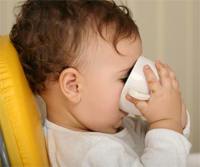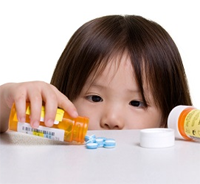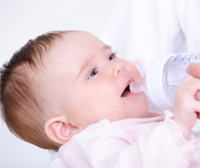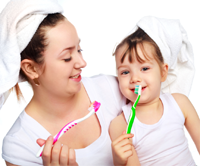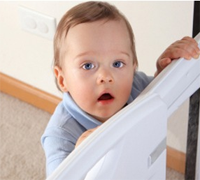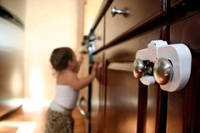KEEP YOUR COOL WITH YOUR BRAND NEW BABY Congratulations!!! The greetings flow from everywhere, you are all smiles when you hear them. But the moment your baby cries, you freak out!! Its a li'l comforting to Mom when the husband doesnot feel nervous, but if both parents are nervous freaks, the house is a big mess. Trust me..its the same with most of us, but feeling the tension is not the solution atall. Keep your cool, maintain a smile, let not your baby know you are tensed. One reason traditionally elders' presence is so mandatory before and after the delivery, is that Grandma has a comforting suggestion for everything. Few points where you can listen to the GrandMother without running to the Doctor everytime. When the baby vomits milk often..its normal for babies to spit milk, they are still learning to swallow food. He/she will slowly get used to gulping liquids and later solids. When the baby cries/ frets during Poop time!!...again, babies are not used it, thier body reacts to the process, some babies cry , others make loud, drawn out sounds...nothing to panic, they will learn to handle it. Cry and cry,...either the room temperature is hot or cold, the diaper is soiled, the baby is hungry, sleepy, bored of staying in the same room..check for these things always everytime the baby cries..even otherwise, babies have been cuddled up in tummy until now, suddenly their feet and hands are let loose, which makes them uncomfortable...swaddle the baby and lull him/her to sleep. they are so used to that rocking movement in Mom's tummy..they will sleep. Following Granny's advice most of the times will save you a trip and money to the Doctor. However, you try all these, still you feel something's wrong, then better call the Doctor's office and get help. - Prathyusha Talluri More articles from this author..... http://teluguone.com/vanitha/content/pediatric-and-child-76-24999.html http://teluguone.com/vanitha/content/milk-allergy-symptoms-76-24978.html
KEEP YOUR PEDIATRIC APPOINTMENTS Some parents dont keep their child's pediatric appointments...its so important to attend the appointments as scheduled by the Doctor..they are for immunizations mostly..Some parents also feel getting multiple vaccines in one visit is unsafe. There are no clear benefits from spacing out vaccines,and the problem with doing so is that the infant goes unprotected for a longer period of time, leaving him/her more vulnerable to dangerous infections, many of which are more dangerous in young children. Starting from a month after birth, a child starts loosing the antibodies he/she was born with. By 6 months, the child has very little extra protection against potentially harmful infections. When you spread the schedule out, you increase the risk that your child will be infected and become ill after being exposed to one of the most dangerous germs. - Prathyusha Talluri More articles from this author..... http://teluguone.com/vanitha/content/ways-to-keep-baby-healthy-76-25013.html http://teluguone.com/vanitha/content/hospital-helpers-76-24920.html
ALLERGIC TO MILK Babies can be allergic to Cow's Milk...yes, that's true. In India it is so common to give babies cow's milk right when they are so tiny but the fact is not every baby can digest it. Two to three percent of kids under age 3 can't handle certain proteins in moo juice---its the most pervasive food allergy among infants. (Dont confuse it with Lactose intolerance). If you feel you have noticed diarrhea interrupting your child's everyday regime, alert your pediatrician. Often, parents spot the problem as soon as the baby starts on cow's milk, but breastfed babies sometimes react to dairy in thier mother's diet. Babies who are allergic to cow's milk may also be allergic to soy-based milk formula, so doctors usually dont recommend it. The encouraging news: More than 80 percent of kids outgrow a cow's milk allergy, sometimes as young as age 3, but often not until age 8 or 9. Doctors are now suggesting parents to introduce Cow's milk only after the child is 1 year old. Whatever be the results of the research thats being conducted, Parents have to always make sure they keep an eye on the child's behaviour every time a new food is introduced to their children and watchout for reactions, change in behaviour, rashes on the body. Spending quality question hour with your pediatrician is very valuable. - Prathyusha Talluri
Prevent Poisoning In Child All the potential poisons like medicines, detergents, paints should be kept out of the reach and sight of your children. Make sure that all the medications - syrups, ointments and capsules - are stored in a medicine box. The syrups and ointments should have child-safety caps on, so that your baby does not pry them open and drink them. Store them in a locked cabinet. Clear all the expired medications from your medicine box. This is because outdated medicines are even more hazardous, when consumed. Always keep your dustbin covered with a lid, so that your kids cannot dig into the toxic things that you have thrown away. Never transfer potential poisons like naphthalene balls, phenyl, paints and cleaning products into coffee cans, milk containers, soda bottles etc. This may lead your child to drink or eat it, accidentally, mistaking them for edibles. Install childproof locks in your cabinets and drawers, before your kids learn to crawl and stand up straight. Keep some common poison treatments at home within your reach, so that you can treat the kid during emergencies, in the absence of a doctor. However, it is always suggested to call upon a doctor in case of poisoning. Be precautious while using household products, when your children are around. You can easily get distracted with other things, which may allow enough time for the children to get curious and creep in. Store the products in locked cabinets immediately after using them. Do not take medications in front of your children. Never refer these medicines as candy, because the children might swallow the 'candy' in your absence, when they get an opportunity to get a hold of the medicine bottles.
HOSPITAL HELPERS Let Dad go home... Don't make your spouse sleep in one of the horrible hospital chairs. He needs some rest before you and the baby get home..if he has slept in a chair for 2days, he will be useless..You savor every moment of alone time with your baby. Drop the Phone... Don't keep chatting with friends or family informing them of the baby's arrival while the Doctor/ Pediatrician/Lactation Expert visits you..Keep aside your phone, use the time in taking valuable suggestions from the experts while they are available. Also cultivate a habit of noting every question you have regarding your baby's health and getting answers for each from the Doctors. This habit will be useful even during the monthly visits to the Pediatrician henceforth. Look for shut eyes.. Newborns are loud, they make all sorts of sounds even during sleep. Dont worry too much, you dont have to grab the baby when you notice such gurgling during their sleep. As long as their eyes are shut, you can take some rest, else you will both get exhausted. Maintain a Smile....Even if the baby cries, which is normal to them, you dont frown..your face betrays you, the baby notices your expressions and repeats them. Smile, be comforting, and talk to your infant. Build a relationship right away. - Prathyusha Talluri
Stick to your baby's routine Disrupting a baby's schedule could make her cranky and irritable. Whenever possible, try to stick to your little one's routine. It's better to make the effort to find a room where she can take a nap than to spend the rest of the day with an overtired baby. Try to keep familiar faces around Too many new faces, sights and sounds can over-stimulate even the most laidback baby. While young babies love to be touched, held, cooed and smiled at, they can tell the difference between strange and familiar faces by the time they are five or six months old. It may take longer for an older baby to warm up to visitors once she is more aware that she's an individual separate from you. So allow her the time she needs, she'll feel more secure if she has a familiar face with her. Choose comfortable clothing Clothes made out of natural fabrics are best as they will not irritate your baby's delicate skin. It's best to pick a colourful, traditional, yet simple outfit that does not have long drawstrings, sequins, beads or mirror work, as these may pose a risk of choking. Watch what your baby eats and drinks If your baby is exclusively breastfed and not weaned yet, it is best to not give her any sweets and savouries. Keep mithais, food, drinks and dried fruits out of your baby's reach. Even if your baby is eating solid food, some foods may not be safe for her just yet. It is best not to give your baby small pieces of food such as whole nuts, cashews (kaju) or raisins (kishmish), when she is just starting solids. Any small piece of food could be a choking risk for your baby. Any foods containing honey should not be given to your baby until she is a year old.
Prepare your kids for diwali Diwali is just round the corner; All the parents must be busy in the preparations like, buying clothes and crackers, preparing sweets, special dishes for the occassion, housekeeping , Party arrangements for the guests etc. However, have ever thought that, along with these arrangements, you need to prepare your kids also for the occasion. Especially when kids are below 5 years, instead of enjoying the “Diwali dhamaka”, they may get fearful of sounds, lights coming when crackers are burnt. Some kids cry throughout the festival, if they get irritated with the ear- splitting sounds. Instead of worrying about things at the last minute, it’s is always advisable to sit with your kids and explain them what is this festival of lights is all about. Ensure that parents take utmost care in terms of arranging lamps, diyas in the house. Make sure, you are not exposing these diyas to kids; instead take all the safety measures. Giving them, sense of security, cuddling them in your arms, slowly introducing crackers to them by lighting mild once, and crackers without sound are the better choices when have kids around. If you know that, your locality will usually make a big blast on every Diwali season, you may go to your friend’s places or any place which is relatively quiet and safe for your infant. Never ever force your child to burn crackers, unless he or she is showing interest. Neither comparing your children with neighbour’s children or teasing them that he/she is a coward is not a good practice. Hence, leave them till they come forward to participate in the event; if not, help your child in engaging with another activity as per his/ her choice. Nothing is big deal if he/ she is not burning the crackers. But if they loose their self confidence with your comments are discouraging talks, it will take much more time for you and your child to regain confidence. Have a safe and happy Diwali!! - M.S.Bhavana
Investigate As a teacher it is your responsibility to handle the bully and ensure the welfare of all your students. Do not wait for the parents of the bullied to vehemently barge into your classroom and charge you of not taking appropriate actions. Keep an eye on student to student interaction. Before you take action and attempt to scold the concerned bully, investigate. Wander into his/her mind and question. What stimulates him or her to carry on with these atrocious and cruel acts? Where do these aggressive traits stem from? More importantly, why has the bully targeted the victim? Is it jealousy? Once you answer these questions, only then can you move ahead with damage control. Stress On Equality & Self Worth As mentioned before, we all come in different sizes. While it is humiliating to be as tiny as a midget, the tall amazons aren’t too comfortable either with their size, until they take on the identity of being powerful. Usually the bigger kids are the ones that take to bullying. A bully spares itself from any kind of teasing in class, by intimidating the rest in the guise of his/her size. As a teacher or parent, let the child know that everybody deserves to be treated as an equal. Size does not matter! It is personality and skills that do! Help him/her discover his/her own self worth so that he/she can discover the worth of everybody else! Eliminate All Threats Bullies bask in the glory of their power and thrive on the splendor of dominating their victims. The poor bullied souls are mortified and try at best to bunk school. They are too scared to let a word out or point fingers at the bully in fear that the bully’s threats may turn into a reality. The moment as parents, you unravel the case of your child’s tormented days, the best move is to contact the teacher or school principal. Threats to destroy belongings and physical assault can be controlled by amicably settling the situation with the parents of the bully. It is of utter importance that you protect your child from all sorts of bullying. Instill Confidence Train your kid to believe in himself/herself and to stand up for his/her rights! You aren’t always going to be around to watch him/her. Teach your children the significance of being able to defend themselves. By keeping mum, they will only encourage the bully to prolong the antics! Let your child know these facts of life and nudge him/her to make new friends.
నెలలు నిండుతున్న ఉద్యోగానికి సెలవు పెట్టకపోతే మీ కడుపులోని బిడ్డకి హాని చేసిన వారవుతారు అంటూ హెచ్చరిస్తున్నారు పరిశోధకులు. ఎనిమిది నెలలు తర్వాత ఉద్యోగాలు వృత్తి పనులు మానుకోవడమే మేలని పరిశోధనల్లో తేలిందట.అలా వెళితే లోపల బిడ్డ ఎదుగుదల నెమ్మదిస్తుందని, బరువు తగినంత పెరగరని ఎసెక్స్ విశ్వవిద్యాలయం అధ్యయనంలో తేలింది. పుట్టినపుడు బిడ్డ బరువు వారి ఆరోగ్యం ఎదుగుదలపై చాలా ప్రభావాన్నిచూపిస్తుంది. కాబట్టి బిడ్డ ఆరోగ్యంగా మంచి బరువు తో పుట్టాలంటే గర్భం ధరించిన తరవాత ఎనిమిది నెలలకు ముందే సాధ్యమైనంత త్వరగా సెలవు తీసుకోవటం మేలని పరిశోధకులు సూచిస్తున్నారు.
1: Adjust your behavior It's easy to tell your son to "man up" or try to make your daughter behave differently. However, the truth of the matter is that some children (and adults) are just more sensitive than others. Instead of criticizing or trying to change your child's behavior, adjust your own. Love your child unconditionally and accept his sensitivity as you would anything else about him. 2: Figure out his triggers Does your child get overwhelmed in crowded places? Does he interact better in small groups rather than large ones? If you find your child gets upset, overwhelmed or highly emotional in certain situations, you can often defuse issues before they start. Work with your child to help him feel more safe and secure. 3: Take things slowly If your child gets distressed over new or different situations, don't thrust her into changes. Instead, take things slowly. Encourage her to try new things without scolding or correcting her behavior if she doesn't take to it right away. You want her to feel more self-confident, not less. So don't push her into a situation where she isn't going to be comfortable. 4: Focus on his strengths Being sensitive isn't a horrible thing. In fact, it can be beneficial in plenty of situations. If your child is especially sensitive to people's emotions or the feelings of animals, it could eventually be the driving force behind his career choices. Sensitive children might have a better than average imagination, be gifted in certain areas scholastically or empathize when many others don't. Focus on your child's strengths and help him develop strong skills and good habits. 5: Get help if you need it In some circumstances, your child's sensitivity may be related to sensory processing disorder. Learn about the signs and symptoms of SPD and talk to your pediatrician. Children with SPD general need more routines in their lives. You can also help curb their symptoms, by using a sensory "diet." Seek help from your doctor, occupational therapists and other specialists to help meet your child's needs.
Here are given some measures to stop this condition: Babies, who are bottle fed, can be given relief by changing the milk, Change in the place/environment, probably the baby is not able to adapt it. Mother, feeding the baby, should avoid foods like cabbage, broccoli, cauliflower, sprouts, parsnip, beans caffeine, alcohol, spicy food, etc, which may trigger such reaction. Babies may not be okay with the cow's milk because it is not easily digestible. Make the baby to burp after every meal, as it really essential for the baby to be fit and happy.
Burping the baby frequently may reduce the spit up tendency and the resulting mess. Mostly, spitting up is not due to dietary problems in infants. So, making changes in formula or changing the diet of the breastfeeding mom is of little help. However, you may still consult your pediatrician about thickening the formula, expressed breast milk and feeding rice cereal in tiny amounts. Shift the position of the baby to upright whenever you feed her/him and keep her/him upright up to half an hour after the feeding. Don't feed much, as smaller and more frequent feedings are easier to digest. Try offering one breast per feeding. You can also try taking him off the breast and putting him back after the initial flow of milk has subsided. If you are giving him supplemental vitamins, iron, or fluoride, then immediately discontinue them as most breastfed babies don't need vitamin supplements. If you are taking herbal or vitamin supplements, try to stop them and see if it makes a difference in the spit-up. If your baby has just started having new food, stop offering it as this may be the cause for spit- up.
Reading a story is one of the best methods to keep your baby engaged. Doing this will not only help you increase his/her attention span, but also enhance his/her imagination power. Talking is another method that can keep your baby mesmerized for hours at a stretch. Whenever you baby is awake, try to talk to him/her as much as you can, even when you are working alongside. Hide some of the toys of your child or change their position. Now, encourage him/her to find new ways of playing with the rest of the toys or the newly arranged toys. This will keep him/her busy and also increase his thinking power. Forbidden territories always tend to make babies more curious. So, it is advisable not to stop them from going anywhere. If they want to make mess in the kitchen, put them in a tub with lots of whipped cream to play with and enjoy. You can also catch some funny and naughty photographs of your child at this time. Playing interactive games with parents are thoroughly enjoyable and preferable for most babies. Such games keep them busy and also increase their bonding with parents. Put the baby in a swing or carrier seat and give him/her some safe toys to play with. This will keep him/her busy for quite sometime. Involve your child in art or craft activities. It is a good method to build up his/her attention span, as he/she will be giving undivided time and attention to the work. Find out the areas in which your child has interest and encourage him/her to indulge in those activities. It could be anything like drawing, building models, sewing and even coloring. Another way to increase your child's attention is through giving him/her some responsibility. Ask your daughter to help you in arranging things and your son to fetch some items for you, while you are cooking in the kitchen. Having a pet can help curb the hyperactivity of many children. Along with that, it will also make them more loving, responsible and proud of themselves. Assign your children some tasks on a daily basis and make sure to appreciate and praise them when they do the work correctly.
The experience that you have under your belt, plus the advice from experts, can help protect your child from a bully. Check out these 5 tips to protect your child from bullies: Take action if you learn your child is being bullied. As a parent, it’s your responsibility to teach your child how to properly respond. Teach your child by example. Research shows that children who witness violence and aggression at home have a higher risk of becoming a bully, or becoming the victim of a bully. This applies to physical and verbal aggression. Give your child clues on how to spot a bully. Some bullies are the stereotypical large, mean boy in the hallway. But other kids bully using degrading words. Your child will learn how to identify a bully and that it’s okay to choose not to be friends with this kind of person. Create an environment that helps your child build friendships. Bullies often target kids who are loners. You protect your child if you help him have good friends. Practice dealing with bullies with your child at home. Just like fire drills at school, practice is an important aspect of learning the right and wrong ways to handle a tough situation.
Here are some tips for cavity control and to prevent tooth decay in children: At night, fill baby's bottle with water while putting him or her to bed. Babies may sprout teeth around 6 months and you should brush them twice each day. Children who love chewing gums may be given ones that contain xylitol to decrease the tooth decay risk. Drink fruit juices only at meals and use carbonated beverages in a limit until the baby is about two and a half years old as they promote tooth decay. For newborns and infants that don't have teeth yet, clean their mouths with a damp cloth after the feedings. Give fluoride to the baby, only if recommended by the pediatrician. Have baby's first oral health risk assessment at six months and then a comprehensive examination by a dentist when he or she is 2 years old. Mom's or caregiver's oral health and the baby's oral health are closely relates. So, practice good personal oral hygiene, brush your teeth twice well and floss teeth at least once daily. Never give carbonated drinks to your baby and give no more than 4 to 8 ounces of juice daily to the baby and that too only at mealtime. Never share utensils with the baby or suck on his or her pacifier or bottle, even for fun. Regular visits to dentist are a must for parents with small children. Use a fluoride toothpaste and alcohol-free mouthwash with fluoride at night to rinse the mouth. When baby's teeth start touching each other, start flossing them daily.
Baby proofing may not be useful to you if your children already crossed the age, but these suggestions will be welcome always for someone who is getting ready for a new baby or a toddler. We have covered the most accidental places in the house, looking for babyproofing. Lets wrap up with the the most crucial piece of advice: Don't leave your child alone in the bathroom, and especially don't leave your child alone in the bathtub (of any size), even for a second. Babies can drown in a few inches of water; don't run out to answer the phone or do anything else unless you pull your child out and take him/her with you. Then, as you did in the kitchen, move harmful products to high shelves, and remove all electrical appliances, handy water heaters and their cords to avoid electrical dangers. Some more purchases to put on your shopping list: Latches for the storage cabinet. A toilet lock A thermometer to ensure baby's bathwater is a safe temperature. Clear cosmetics and shampoos off sink and tub ledges, as they pose a poison risk. Overall in the house: Make sure all of your houseplants are nontoxic varieties. Some plants are extremely poisonous. Empty ashtrays promptly and keep matches, lighters, and tobacco products locked away from baby. Vacuum regularly to remove loose coin change, paper clips, or any small item that can cause choking. Place locks on liquor cabinets; alcohol can be poisonous to young children. Cover radiators and heating vents to prevent burns. Check your doorstops; you may place them at the top of the door but not the ones at the bottom, many have removable caps that pose a choking hazard. Keep toy batteries safely stowed away; they can leak acid, causing serious burns. - Prathyusha Talluri.
Living room is where the fun is Falls and collisions with furniture are the biggest dangers to your baby in this room, so you'll want to add cushioned corner guards or edging to coffee and side tables, hearths, and any other sharp-cornered surfaces. if the corner-guards are not available in the market, try to move the center table to the other room where the baby doesnot go usually. Baby might also get the idea to climb on furniture. Move everything away from your windows so baby can't climb up and fall out. Mount bookshelves to walls so they can't topple over. Attach the TV securely to an entertainment center or table so baby can't pull it down on herself. All knickknacks are fair game for baby's play, so if you don't want her to touch something, store it away. Think about these items for your family room: If your windows have curtains, then make sure the holders are strongly fixed to the wall, if you dont mind, remove the curtains for just few months. Cordless blinds (the cords on blinds and curtains are strangling hazards). Heavy-weight picture hooks to prevent pictures from falling off the wall. Electrical tape to secure electric cords away from baby.
Surround your swimming pool with a 4 feet tall fence. Ensure that the gaps between the fences are no wider than 4 inches. Add an underwater pool alarm that sets off, when something hits the water. That way, you will ensure that your toddler, who doesn't know swimming, doesn't approach the pool. Even if he/she approaches, make sure that the alarm is loud enough to be audible, when you are indoors, so that you could take immediate action for his/her rescue. Install a rigid, motorized safety cover to refrain the access to the pool, when it is not in use. You can also prevent the toddler from approaching your pool, when not in use, by locking the pool steps or ladders. Do not leave the pool toys floating in water. In an attempt to retrieve the toy, your child might jump into the pool, which may in turn lead to an accident. You may teach your child to swim, when he/she is 5 years old. Be sure to drown-proof your child, when he/she is learning to swim. Never allow your child to allow to swim without the supervision of an adult.



